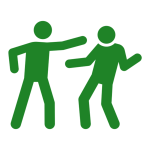Do I need a health and safety policy or protection for volunteers?
Although volunteers are not included in Health and Safety legislation in the same way as paid staff, any organisation involving volunteers has a legal responsibility and a ‘duty of care’ towards their volunteers.
Most Charity or Not-for-Profit organisations utilise Labour Hire or a 3rd party company with a sales force for their fundraising duties and must be aware that there is a co responsibility for the duty of care and safety of the total workforce be it direct employees for subcontracted.
All duty holders in a labour hire arrangement must consult, cooperate and coordinate with each other so far as is reasonably practicable.
Main risks in Not-for-Profits or Charities Sector
Not-for-Profits or Charities workers face two main risk profiles:

Social Risk
Being that of work place violence and aggressive behavior; physical or verbal assault

Physical Risk
Slip/trip/fall/person down or incapacity, unconsciousness, accident or incident, or even a medical situation
WHY EVERYONE IS CHOOSING GPS GEO GUARD
Not-for-Profits or Charities almost always have a mobile workforce or charity workers and fundraisers, and should be treated with dignity and respect.
We may know the risk profile of our client, but not who is going to be there at the same time as your time of visit or what may occur at the job environment.
Implementing the GPS Geo Guard Personal Safety Solution can deliver safety benefits to the front-line health care workers, and also help department managers and the wider organisation deliver genuine value to the employer in terms of safety, quicker emergency response, operational and increasing staff moral knowing they have something just in case.

Aggressive workplace violence from public

Slip/trip/fall

Verbal threats

After hours work

Working alone or isolated even when working as a team

Lone wolf attacks of retaliation from strangers in the public
Benefits of using Gps Geo Guard Solution in all Not-for-Profit sectors
Helping customers to:
Give 100% peace of mind to mobile workforce staff and lone or high-risk workers with 24/7 instant Emergency Alarm Monitoring and support, with the GPS Geo Guard discreet personal safety devices
Document verbal abuse with live and recorded audio to stop the “he said, she said” situation and verbal assault; best practice for internal discipline or escalation to Police
Deliver protection against person down, slips/trips/falls, incapacitation, or medical emergency incident
Get instant continuous up to date location information to assist better coordination across mobile teams and reallocation of workforce
Deliver up to date live reporting to key stakeholders on GPS Geo Guard Device and solution usage, for 100% user uptake and better business or organisation’s continuity
Greater visibility and enhanced safety protocols and procedures around the use of the GPS Geo Guard of any mobile workforce
Creating a positive Safety Culture and encouraging your workforce to report incidents, and document them effectively enhancing faster responses and better outcomes.
Section 19 of the Work Health and Safety Act 2011 states that:
A person conducting a business or undertaking must ensure, so far as is reasonably practicable, the health and safety of—
(a)workers engaged, or caused to be engaged by the person; and
(b)workers whose activities in carrying out work are influenced or directed by the person;
while the workers are at work in the business or undertaking.
In addition to this, Section 16 of the Act states that:
More than 1 person can have a duty
(1)More than 1 person can concurrently have the same duty.
(2)Each duty holder must comply with that duty to the standard required by this Act even if another duty holder has the same duty.
(3)If more than 1 person has a duty for the same matter, each person—
(a)retains responsibility for the person’s duty in relation to the matter; and
(b)must discharge the person’s duty to the extent to which the person has the capacity to influence and control the matter or would have had that capacity but for an agreement or arrangement purporting to limit or remove that capacity.
PCBU is a person conducting a business or undertaking alone or with others, whether or not for profit or gain. A PCBU can be a sole trader (for example a self-employed person), a company, unincorporated association or government department or agency. A PCBU is often, but not always, an employer. A ‘volunteer association’ is not a business or undertaking under the Work Health and Safety Act 2011. A ‘volunteer association’ is a group of volunteers working together for one or more community purposes that does not employ anyone to carry out work for the association. Unless otherwise stated, where the word ‘employer’ is used in this guide it is referring to a PCBU.
Primary Carer
A person who provides personal care, support or help to a client and is not engaged as a paid or volunteer worker, often a family member or guardian.
Worker
A person who carries out work in any capacity for a person conducting a business or undertaking. Examples of health and community care workers include personal carers, care providers, nurses, social/welfare workers, therapists or other people performing health care or community work at the direction of a person conducting a business or undertaking.
Workplace
A place where work is carried out for a business or undertaking and includes any place where a worker goes, for work. This includes a client’s home or part of their home (for example kitchen), a vehicle or a community venue. A workplace where a service is being undertaken in isolation from the assistance of other people because of location, time or nature of the work is considered to be one where isolated work is being undertaken
A PCBU (such as a service provider, or host employer of subcontractors or agency staff), has the primary duty of care and must do what is reasonably practicable to ensure the health and safety of their workers, including agency staff, subcontractors, volunteers, and others at the workplace such as clients. Participants in the National Disability Insurance Scheme (NDIS) can choose to engage a disability service provider, an independent contractor (with their own ABN) or directly employ a worker. When directly employing a worker or contracting work, plan nominees and participants have a duty of care under the WHS Act 2011 as employers. Workers, including subcontractors or agency staff, also have a duty of care to:
·
·
·
take reasonable care for their own health and safety
take reasonable care that they do not adversely affect the health and safety of others
comply, so far as they are reasonably able, with work health and safety instructions and cooperate with the PCBU’s policies or procedures about work health and safety. This may include following reasonable instructions relating to the delivery of the care plan, only undertaking activities that have been agreed to in the client service agreement, and wearing personal protective equipment (PPE) like the Geo Guard they have been provided and trained in using properly.
Others at the workplace (for example, clients, visitors, family members, participants) have a duty to:
·
·
·
take reasonable care for their own health and safety
take reasonable care that they do not adversely affect the health and safety of others
comply, so far as they are reasonably able, with any reasonable instruction given by the business or undertaking carrying out the work.
As a volunteer you may carry out work for an organisation from your own home. If this is the case, you still have a duty as a volunteer worker under the WHS Act when carrying out your volunteer work.
Total risk assessments are essential but should be back up by GPS Geo Guard Device for the quickest response and links to Emergency Monitoring and Emergency First Responders for the best outcome in any incident.
MORE DISCREET • MORE ACCURATE • MORE RELIABLE • MORE USER-FRIENDLY • MORE LIVES SAVED • MORE AFFORDABLE
Track | Manage | Mitigate | Secure | Communicate | Respond | Rescue

